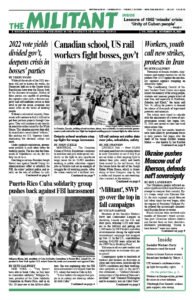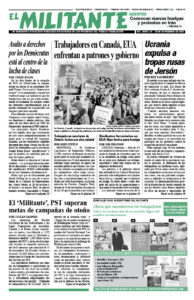CARDIFF, Wales — Some 1,700 people joined discussion about how to advance the fight for women’s equality at the conference of FiLiA here Oct. 22-24. FiLiA, which describes itself as part of the women’s liberation movement, means daughter.
Support for the fight against women’s oppression and for political rights in Iran was a feature of the final conference session, which was addressed by Nazanin Zaghari-Ratcliffe. An Iranian-born charity manager, she was released from prison in March after authorities pressed her to sign a false confession of spying for a foreign power, a condition for allowing her to return to her family in the U.K. FiLiA participated in the campaign to win her freedom.
She paid tribute to those standing up to the Iranian regime’s assaults today: “There is this anger that has been suppressed in women, in people in Iran, for a very, very long time, and we are not just talking about freedom of what to wear.”
The erosion of hard-fought gains for women’s equality in the U.K., won over centuries of struggle, was a feature of many of the conference panels. Olympian athletes Mara Yamauchi, a marathon runner, and swimmer and TV personality Sharron Davies described current attacks on women’s sports carried out in the name of “transgender rights.”
Boxing and rugby are now the only sports in the U.K. “in which the women’s category is for females only,” Yamauchi said. Allowing men who identify as women into women’s sports based solely on testosterone levels, ignores “everything to do with having a female body which affects sports performances — menstruation and pregnancy, childbirth, breastfeeding.”
Censorship of women authors who say a person’s sex is determined by their biology was addressed in another panel. Milli Hill, author of the children’s book, My Period, told participants her publisher, Wren and Rook, demanded she insert a sentence in the book saying, “It’s not just girls who get periods, trans boys and non-binary people do too.” When Hill objected, the publisher threatened to withdraw her advance and eventually appointed a “sensitivity reader” to review the manuscript.
“‘Sensitivity readers’ are a relatively new thing,” author and editor Julia Williams told participants. “It’s another layer of censorship.”
Organized annually since 2013, this was FiLiA’s largest ever gathering, with participants from all over the U.K. and several other countries. Many women’s rights groups took part, including Women’s Rights Network, A Woman’s Place U.K. and Abortion Rights Cardiff.
Not everybody welcomed the conference. South Wales police say they are investigating an online threat to burn down the venue. The threat came from someone smearing participants as “trans-exclusionary radical feminists.”

